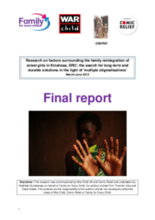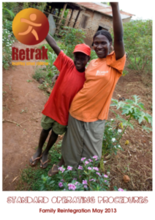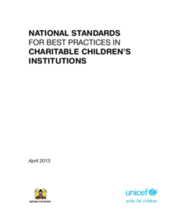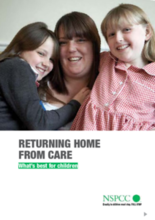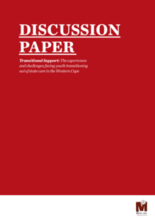Displaying 861 - 870 of 952
The aim of this study was to explore the experiences of residential care from the perspectives of a group of young people who had lived in residential childcare institutions in Bangladesh with a view to making improvements in residential childcare in the future.
Oxford Policy Management has conducted two rounds of qualitative evaluations of three poverty-reduction and human development programmes run by the BOTA Foundation in Kazakhstan: the Conditional Cash Transfer (CCT) Programme, the Social Services Programme and the Tuition Assistance Programme. Each report produced by Oxford Policy Management includes a description of the methodology and results of the fieldwork as well as conclusions and recommendations.
In this TED talk, Lemn Sissay recalls his experiences of the care system, the search for his birth family and the insights this has given him.
This research looked at the factors affecting the family reintegration of girls in the Tshangu district of Kinshasa (DRC), an operational zone of the local NGO OSEPER, a partner of War Child for a 3-year project, seeking to address the needs of street-connected girls, including family reintegration.
The multidimensional standardised assessment tool, the North Carolina Family Assessment Scale—Reunification (NCFAS-R) was used in this study by practitioners to assess family strengths and needs in case planning and reunification decision making. The current paper examined (1) whether NCFAS-R domain ratings at intake and closure differ by characteristics of parents and children; and (2) whether reunification is predicted by NCFAS-R score at closure.
This systematic review, co-registered within both the Cochrane and Campbell Collaborations, summarizes the evidence from empirical studies comparing the effectiveness of interventions that have been established to promote inclusion and reintegration, and to reduce harm, in street-connected children and young people (who work and/or live on the streets) worldwide. The review includes 11 studies, evaluating 12 interventions from high income countries. No studies from middle and low income countries are included due to inadequate quality of available studies.
Retrak, a UK-based organization working with street children in Africa, has published an excellent practical manual detailing its standard operating procedures (SOPs) for family reintegration for children working or living on the street. This document includes guiding principles of family reintegration, key steps, tools, monitoring and evaluation, as well as variations on the key steps of family reintegration.
This document was developed with the aim of assisting Charitable Children’s Institutions (CCIs) in Kenya to boost their capacity for determining which children need to be admitted into CCIs, how to provide adequate care and protection to the children and how to plan the eventual exit of the children back to their families and communities.
This report, published by the National Society for the Prevention of Cruelty to Children (NSPCC) in the UK, highlights the need to improve outcomes for children leaving care and returning to parents or families. The NSPCC provides recommendations for policymakers and practitioners to improve the quality of assessment, planning, and preparation regarding when and if a child should be returned home from care and to increase the support for children and their families once they return to their families.
In 2012, Mamelani began an assessment of the content and focus of its transitional support programme. The aim was to consolidate its existing practice as well as to discover and implement new ways of ensuring more participants in its programme make a successful transition out of care.

